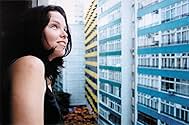My mother has a friend who has lived in Edifício Master for over 20 years. So I have been to the building several times over all these years, mostly during my childhood. I recently met her and we spoke about the movie. She hated that it was made, and refused to be interviewed. She also did not watch the movie herself. There is a big stigma associated to buildings like Ed. Master (there are a few like it in Copacabana, but not that many). There are even stories about buildings that had their street numbers changed, so bad the reputation they earned, always in connection with prostitution and drug dealing. What I like about the movie, is that it shows that it is true that prostitutes do live there, but also that everyone is a human being, with often complex feelings. It is interesting to see how important it was for several of those interviewed to live in Copacabana, a famous postcard from Rio. Almost all of those are not from Rio, which adds a little to the postcard effect. Copacabana is indeed a very diverse, I'd even say strange place. Many tourists, a lot of violence, many street-kids snorting glue, smoking dope, a huge number of prostitutes. Both female and male (mostly transvestites). The only thing I think was missing was a transsexual interviewee (I'm sure there are some living there).















